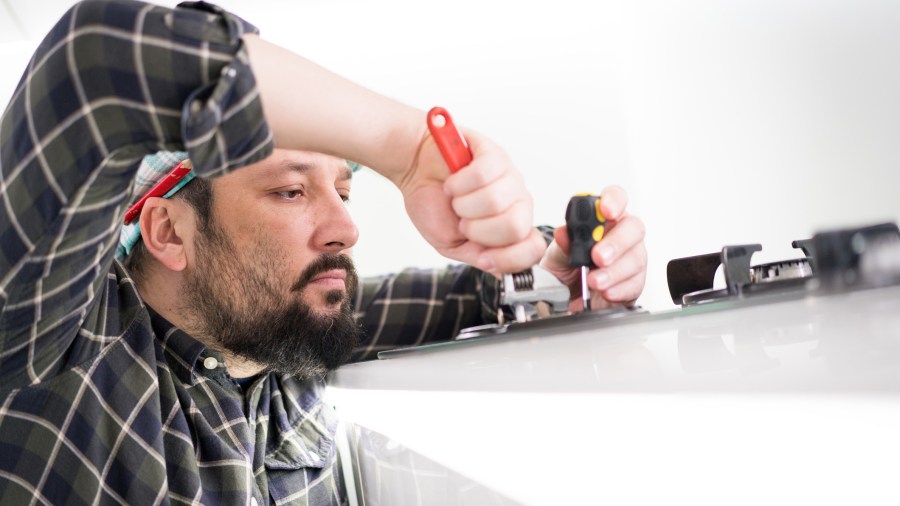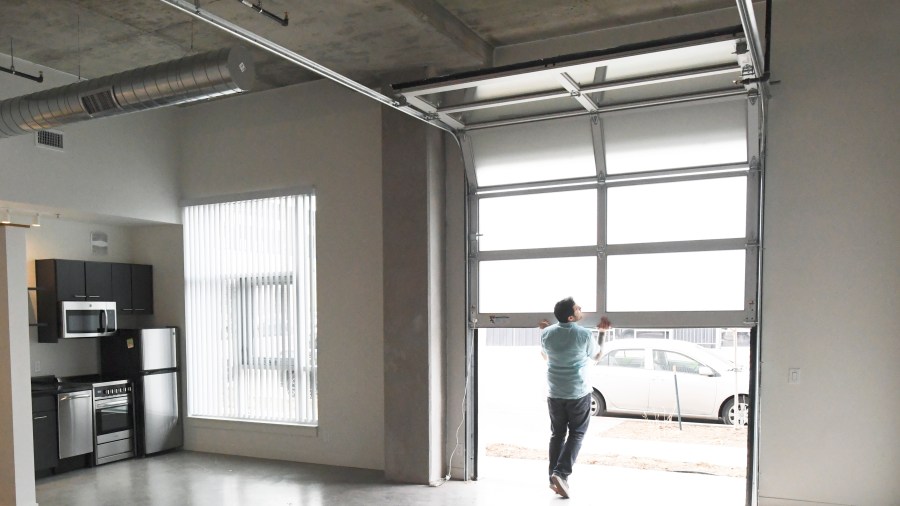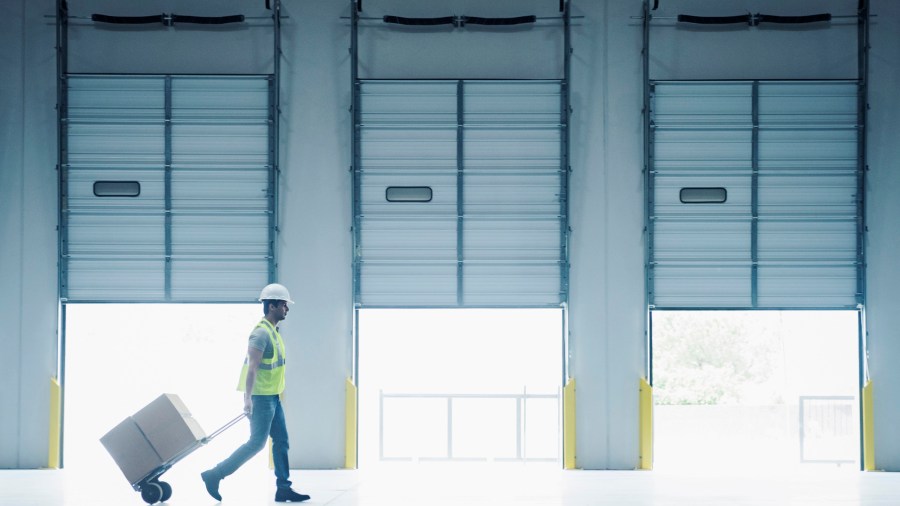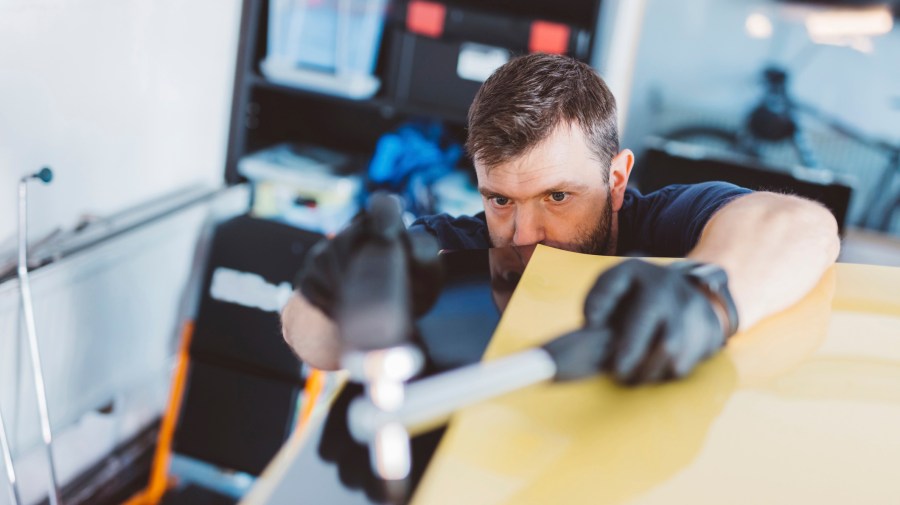Who Writes Garage Insurance For Truck Repair

When you're in a rush to leave for work or coming home after a long day, few things are more frustrating than a garage door that doesn't open and close properly. Repairing the door yourself can be a daunting task — but so can paying for repairs. Fortunately, if you can correctly diagnose the problem, it may be possible to take care of the problem yourself by breaking what can seem like an overwhelming challenge down into manageable parts.
Not sure where to begin? First, take a look at some common issues that occur with garage doors to see if you can diagnose the problem. Next, consider these possible ways to approach simple problems to handle them yourself. Let's get started!
Tighten Any Loose Components
The first step in evaluating your garage door is the simplest but also the most important. Visually inspect the door to look for bolts, screws or other parts that seem to be too loose. This includes looking for loosely attached mounting brackets, spring plates and hinges. If the bolts and screws are loose on any of these components, tighten them.

If a screw has worn down the threads in the hole or on the screw and no longer fits securely in the hole without falling out or coming loose, you can fill the hole with a hollow fiber plug and some wood glue. Wait for the glue to dry and then replace the screw with another screw that has the same diameter but a longer length. Alternatively, you could also screw or tap (depending on the style) a screw anchor into the hole and then screw a new screw into the anchor.
If your garage door isn't sliding properly or is completely stuck, you could have a problem with the rollers on the door or the tracks the rollers travel along. Inspect these parts for signs of damage, especially dents or bends that could be preventing the rollers from traveling smoothly along the track. Clean the tracks and rollers, if necessary, to remove any dirt or materials that could be obstructing the path and then lubricate using a silicone or lithium-based grease — not WD-40! — to ensure smooth movement.

If the tracks aren't aligned properly — which can happen with frequent use — you will need to loosen (but not remove) the screws and gently move the tracks back into place. Use a level to ensure the tracks are properly aligned. Sections of track that are horizontal should be slanted slightly downwards, but vertical sections of track on both sides of the garage door should be perfectly upright.
Evaluate the Garage Door Springs
The torsion springs on garage doors eventually wear out, particularly on garage doors that are used a lot. Garage doors designed for single-car garages only have one spring that bears tension, and that construction introduces a greater risk of injury, which means you should call a professional to adjust or replace the single spring. However, two-car garage doors have more than one spring, which sounds more complicated, but this construction actually makes it safer for untrained homeowners to complete repairs themselves as long as they conduct significant research before attempting to do so.

Two-car roll-up doors usually use a cable on a pulley to adjust spring tension. The cable can be pulled, tightened and re-knotted to achieve the desired tension. For two-car garage doors that swing up, the spring tension can be adjusted by moving the spring hooks to different notches on each side of the door. It's extremely important to fully review and understand the process before attempting to make any adjustments to springs.
Investigate the Garage Door Opener System
If you have a garage door opener attached to the garage door that won't open at all, it could be a problem with the motor on the unit or the remote control functionality. If you hear strange noises coming from the unit when you activate the garage door opener, the problem is probably a motor issue. You know (at least subconsciously) how the motor sounds on your opener, so it should be easy to hear when it doesn't sound right. If the motor doesn't start at all, it could be either the motor or the remote control.

First, make sure the lock feature wasn't accidentally activated on the remote. Some older models won't have this feature, but newer models will. Next, try replacing the battery in your remote control. Battery longevity in garage door remotes can vary greatly, with some lasting years and others requiring frequent replacement. If the remote still fails to activate the door after replacing the battery, refer to the user manual for your unit and follow the instructions for reprogramming the remote. (This may also be necessary after battery replacement.) If that doesn't work, you may need to replace the remote entirely.
If the garage door tries to activate but then reverses, something could be blocking the sensor that tells the garage door opener that it's safe to open or close the door. First, check to make sure nothing is blocking the laser light beam coming out of the sensors on each side. If the lights are no longer working, you may need to replace one or both sensors before the door will work.
Hire a Professional
If these tips don't reveal a simple problem you can fix yourself, you may need to hire someone to diagnose the problem and perform professional repairs. Professionals can handle many more complicated repairs, but in some cases, you may have to replace the garage door or the opener entirely. If that happens, be sure to thoroughly investigate the cost of replacement to ensure you get the best equipment at the best price. Consider factors such as the durability of the new components, power consumption and warranty details in addition to price.

MORE FROM BLOGLINES
Who Writes Garage Insurance For Truck Repair
Source: https://www.bloglines.com/article/how-to-repair-your-garage-door?utm_content=params%3Ao%3D740010%26ad%3DdirN%26qo%3DserpIndex
Posted by: piercearld1950.blogspot.com

0 Response to "Who Writes Garage Insurance For Truck Repair"
Post a Comment